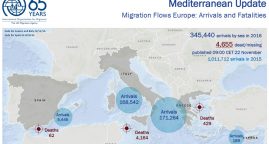The Guardian view on the Arab spring: it could happen again
Article published on The Guardian website on 01/02/2017
The Arab world is home to 5% of the global population, but accounts for half of all terrorist attacks. With poverty outpacing the growth in numbers of young people and democracy crushed, a revolt could re-emerge
This month marks six years since the beginning of the Arab spring, a series of events that were meant to be a major turning point in the modern Middle East. It was the self-immolation of a Tunisian street vendor and his death on 4 January that initiated a revolutionary year. The subsequent protests energised ordinary Arabs, who recovered, it seemed, a popular self-confidence diminished by six decades of autocracy. The Arab street was honoured for its people’s courage and determination, inspiring movements across the world. Protesters did not just voice their complaints, it was said, they changed the world. Four Arab leaders fell. Yet six short years on those dreams are now in tatters. In Egypt, the most populous Arab nation, a counter-revolution has returned a military dictatorship. Much of Libya and Yemen is reduced to rubble in a war where outside powers are the principal actors, prepared to fight until the last local is dead. Syria is in ruins, stained by rivers of blood. The sole democratic success was Tunisia, which did see a peaceful transition from authoritarian rule to elective government. The main Islamist party won power and last year declared it would end all of its cultural and religious activities to focus only on politics – becoming a Muslim democratic party, rather like its western Christian counterparts. But every silver lining has a cloud: Tunisians make up the largest number of foreign fighters in the ranks of Islamic State.
The underlying reasons for revolt have not gone away. In many ways the conditions today are even more explosive than in 2011. The Arab state is in crisis almost everywhere: plunging oil prices have holed Saudi’s economy; Egypt’s flawed leadership has created crisis after crisis. The desperate men and women leaving for Europe want a better life than that found at home. According to the UN’s Arab Development Report – the first since the Arab spring erupted – the Middle East is home to only 5% of the world’s population, but accounts for 45% of the world’s terrorism, 68% of its battle-related deaths and 58% of its refugees. This at a time, the UN warns, when the population of young Arabs exceeds 100 million and is growing fast – but not as fast as rates of unemployment, poverty and marginalisation.
The rise of the largest, best-educated and most highly urbanised generation of young people in the region’s history – far more pious than their peers in other parts of the world – looks like a destabilising force. The response in the region has been a crackdown: crushing dissent, but not addresssing the reasons why it exists. Small wonder the UN warns of an “accumulation of demands and their re-emergence more violently”. The reasons for another cycle of protest are obvious. The Arab world bristles with swords not ploughs, spending $75bn a year on arms in the past quarter of a century. A hereditary elite hoards power. Business is undergirded by “wasta”, the Arabic for connections. Corruption has resulted in the waste of vast resources: the UN says about $1tn has been pilfered over half a century. This could have been invested in creating jobs and improving basic services. The thinking that shuts out challengers to the status quo needs to be dispensed with.
In politics the dangers are clear. If there are no mechanisms for participation and accountability which allow for peaceful protest, then the disgruntled may explore direct, violent actions. In the Arab world this requires an insight into political Islam. The Sunni world is dealing with a psychology of anxiety. A people sharing a rich cultural, religious and linguistic heritage, the Arab world’s largest ethnic group has seen its great cities fall to rivals: Mosul, Aleppo, Jerusalem, Baghdad and Damascus. In the geopolitics, recent events have exposed how Arabs have once again become pawns on the chess board. The landmark resolution at the UN demanding a halt to all Israeli settlement in the occupied territories was not presented by an Arab nation. In Syria, a peace plan was delivered not by a Sunni Arab power, but by Russia, Iran and Turkey. The arrival of Donald Trump in the White House will allow Arab despondency to be dismissed. Theresa May’s ill-judged jab at US Secretary of State John Kerry for a speech criticising Israel was a move in this direction. Mrs May, who refused to follow the Obama administration in blocking arms exports to Saudi Arabia after civilans were bombed, is more interested in defence sales than the well-springs of democracy in the Arab world. This is a mistake: those cut off from changing their own societies by democratic means may turn their anger inwards – or outwards.
Related Articles
What’s Driving the Global Refugee Crisis?
09/15/2016. A record 65 million people have been displaced from their homes, mostly by war. Half are children.
Mediterranean Migrant Arrivals Reach 345,440; Deaths at Sea: 4,655
11/22/2016. The Central Mediterranean route connecting North Africa to Italy has proved the deadliest passage, accounting for over 4,100 of this year’s drownings.
The Sovereign Order of Malta Observer to the Central American Integration System (SICA)
12/01/2015. The economic, cultural and political organization will allow the Sovereign Order of Malta to participate actively in regional medical and sanitation programmes and to intervene more effectively during natural disasters.





